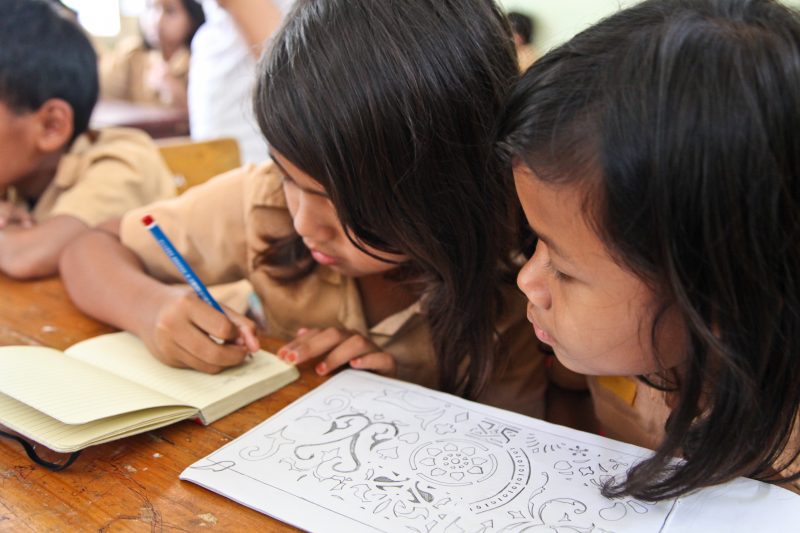“Education is not preparation for life; education is life itself.” – John Dewey (1859 – 1952)
Psychologists will tell you that the first three years of one’s life are the most important. In terms of bonding with one’s mother, of having a healthy diet, learning to walk and talk, one can but agree.
But at the age of five or thereabouts, the expectation is that human babes leave the nest and go to this strange place called school. If we’re lucky, there is a mother figure in charge of the reception class for initiates. I was lucky with Mrs. Davies, even though I got pushed off the rocking horse on my first morning and got a bloodied nose.
Looking back on those few years, I can reflect on learning to play a musical instrument well – the descant recorder. I collected stamps so I knew where countries were on the map. I read about them from books I got from my local public library, where I also came to love adventure stories. As a member of my local Wolf Cub pack (junior boy scouts), I learned about the importance of social service because we’d take part in Bob-a-Job week. This meant going around our neighbourhoods and doing odd jobs such as mowing someone’s lawn or running errands to the shops in return for a ‘bob’, a shilling in pre-decimal money (and 5p in today’s currency).
Inevitably there came a time when life changed drastically: I sat the 11+, the school leaving exam. At that time in post-war Britain, there were two streams of schools: secondary moderns, where students were prepared for life as workers, and grammar schools, where bright students were groomed for tertiary education and an adult life in charge of the workers.
I was one of those bright students, and have regretted it ever since – none of my former classmates were with me. Life became a matter of competition rather than the fostered co-operation of my elementary school years. At my elitist grammar school, with its carrot and stick regime, exam results were important if we were to achieve greatness. The top A stream students were groomed by being appointed school monitors and given free rein to boss we lesser mortals in grade C, my natural level. The ultimate prize was to have our names on the ‘Roll of Honour’ because we’d brought reflected glory by going on to a top notch university. My name isn’t there, thankfully. I resented the fact that I was expected to be someone I wasn’t and that I hadn’t been given the opportunity to discover who I was going to be.
So I became a teacher.
The word ‘education’ is derived from the Latin word ‘educare’ which means ‘to bring up’. The methodology decrees the acquisition of knowledge as provided by teachers through a school curriculum as determined by ‘authority’ (i.e. the government of the day and its bureaucracy). A simplistic term is schooling, which is the regimen used to train circus seals to honk horns and to clap with their flippers.
Another Latin word is ‘educere’ which means to ‘bring forth’, the drawing out and encouragement of individual talents and innate abilities developed both in and outside the classroom.
So how does this relate to Indonesia?
Education consultant Mark Heyward succinctly points out that “Indonesia’s education system was designed to provide the nation’s huge population with the basic skills of literacy and numeracy, religious piety and nationalistic values.
It has succeeded well in these goals. But the world has changed and the education system has not changed with it. The system fails to produce an educated population with the skills of critical thinking necessary for a modern, open and democratic society or with the workplace skills necessary for a competitive economy.”
In 1950, when the first post-Independence Education Act was brought into law, the population’s illiteracy rate stood at about 50 percent. According to UNESCO, in 1970, when this had been brought down to about 21 percent, Suharto’s government introduced the Package A programme, which was divided into 100 modules, of which A1-A10 were basic literacy, and A11-A100 were focused on literacy in the context of life skills. Over the period of the next three decades, illiteracy was reduced to approximately 11 percent in 2000.
However, basic literacy refers to the ability to read simple instructions, whereas the failure is in functional, or critical literacy; the ability to form opinions beyond the printed words. Since 1998, the downfall of Suharto and the dawn of the Internet, one may have expected that conditions within the state schools system would have improved.
A fellow qualified teacher from the UK writes that “a school is only as good as its teachers – and its teachers are only as good as their education, professional training and job satisfaction.”
Well, they and the current students’ parents were afraid to express contrary thoughts during the Suharto era and this has led to the inability to be responsible or to think of consequences. I discovered this early in my teaching here in Jakarta. I asked my advanced English class of business executives how they would have spent US$1,000 if I had given it to them the previous week. One of them said that he couldn’t answer the question.
“Why not?” I asked him.
“Because you didn’t give me $1,000.”
He’d grasped the grammatical structure, but not the concept.
Twenty percent of the government budget is supposedly allocated for education; that is a figure within the country’s constitution, but only recently during SBY’s presidency has it been enforced. The budget is transferred to regional authorities for ‘operational expenditure’, thus adding further layers of bureaucracy to the process, and expanding the potential for delays and embezzlement. Just this month we read of a primary school’s ceilings collapsing on four classes: the school had been waiting for renovation for three years.
Teacher training is geared to classroom practices and the need to ‘teach to the test’, all of which in terms of ranking are multi-choice. There is a government programme to ‘certify’ teachers, yet that too has been criticized in that materials for the courses are not always available.
Ministers come and go, each one seeking changes to the curriculum. Although the national tests are no longer the factor which determines whether students graduate between the three school levels and into universities, that they are now extended to those schools outside the state system which offer curricula from abroad is yet another indication that the powers that be have no underlying philosophy of educational value. Everything is a band-aid solution.
My fellow teacher perhaps best expresses my frustration as both a teacher and a parent.
“In spite of all the problems, a visit to a local Jakarta school shows keen and dedicated teachers, who – while painfully aware of their professional limitations – do their level best to provide a good education for their students. Indonesia’s future development and economic success depends so much on the nurturing of an educated workforce, that to not invest in its teachers and make the teaching profession an attractive and adequately-remunerated career is more than a misfortune – it is a crime.”




